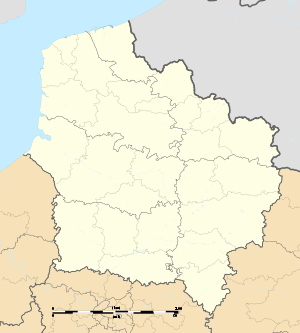Halluin
Halluin (French pronunciation: [alɥɛ̃]; Dutch: Halewijn) is a commune in the Nord department in northern France.
Halluin | |
|---|---|
 Mont d'Halluin district | |
 Coat of arms | |
Location of Halluin 
| |
 Halluin  Halluin | |
| Coordinates: 50°47′01″N 3°07′32″E | |
| Country | France |
| Region | Hauts-de-France |
| Department | Nord |
| Arrondissement | Lille |
| Canton | Tourcoing-1 |
| Intercommunality | Métropole Européenne de Lille |
| Government | |
| • Mayor (2014-2020) | Gustave Dassonville |
| Area 1 | 12.56 km2 (4.85 sq mi) |
| Population (2017-01-01)[1] | 20,800 |
| • Density | 1,700/km2 (4,300/sq mi) |
| Time zone | UTC+01:00 (CET) |
| • Summer (DST) | UTC+02:00 (CEST) |
| INSEE/Postal code | 59279 /59250 |
| 1 French Land Register data, which excludes lakes, ponds, glaciers > 1 km2 (0.386 sq mi or 247 acres) and river estuaries. | |
Geography
It is located at the north of the Lille Urban Community, on the Belgian border, contiguous with the Belgian town of Menen.
Transport
Bus
L91
Rail
The line was formerly served by the Somain-Halluin Railway.
Road
The A22 autoroute links the town to Lille and Belgium.
Heraldry
 Arms of Halluin |
The arms of Halluin are blazoned : Argent, 3 lions sable langued gules, armed and crowned Or. |
Politics
An erstwhile bastion of the left, Halluin owes its nickname Halluin the Red to the powerful trade unions who used their influence to support Communist mayors during the interbellum. However, since the 1990s Halluin has become gentrified (see also below), and in the 2007 and 2012 presidential elections the town backed Nicolas Sarkozy.
In 2014 mayoral elections, voters chose the right wing parties by a solid margin of 62% :
Gustave Dassonville (UMP) received 40% of the votes and Jean-Christophe Destailleur (Centre-right) received 22% of the votes.
Left wing parties with 38% of votes have been defeated, and Gustave Dassonville has been elected mayor of this town.[2]
Despite the noted gentrification of Halluin, the neighbouring town of Menen, Belgium, situated within walking distance of Downtown Halluin, underwent a simultaneous radicalization, given the municipality's attempts to ban its employees from speaking French to Francophone people whose command of Dutch may be limited, and to use sign language instead. While some townsfolk of Halluin's adjoining conurbation may have regarded this as a brave attempt to enforce Flemish supremacy over Francophone neighbours, others including Francophone neighbours themselves and international observers may have regarded such a measure as allegedly fanatical and insensitive to the needs of Francophone neighbours with limited command of Dutch; and international press comment was provoked by these municipal regulations.[3]
Points of interest
Twin towns
Halluin is twinned with:
See also
References
- "Populations légales 2017". INSEE. Retrieved 6 January 2020.
- 2014 Municipal election Halluin ( Newspaper Le Monde)
- INSEE commune file
- 2014 Municipal election Halluin ( Newspaper Le Monde)

External links
| Wikimedia Commons has media related to Halluin. |
- Halluin official website (in French)
- 100% Halluin (in French)
- Halluin Tawhid Masjeed official website (in French)
.svg.png)